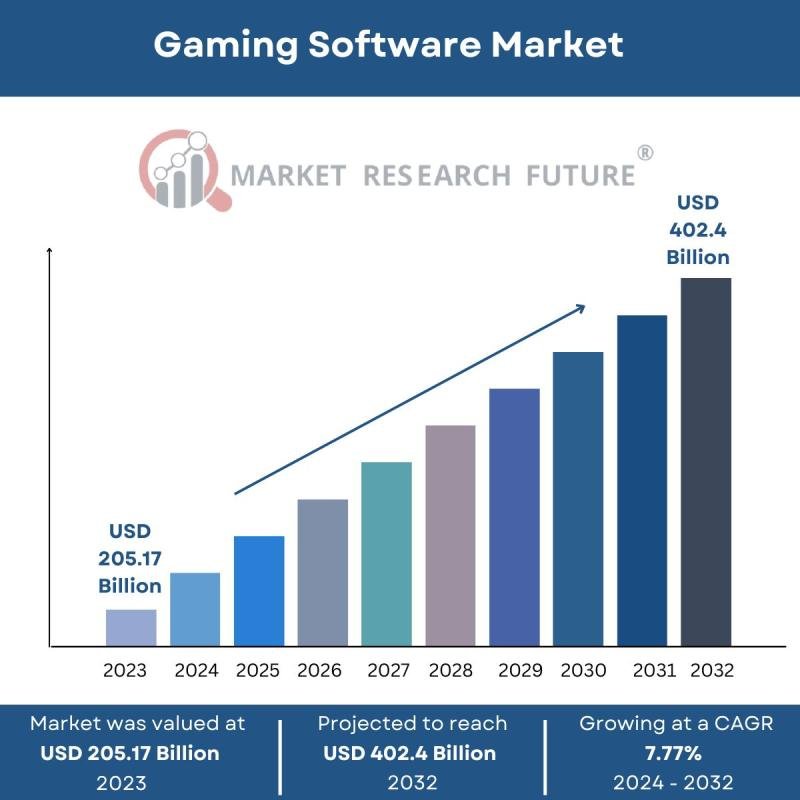➤ Gaming Software Market Overview:
The gaming software market has seen significant growth, driven by the increasing popularity of gaming as a mainstream form of entertainment and the rising penetration of smartphones and high-speed internet. With the availability of diverse gaming genres, audiences across all demographics are engaging more frequently, creating a robust demand for innovative gaming solutions. Notably, advancements in technology, including cloud gaming and augmented reality, are transforming the industry by enhancing accessibility and offering immersive experiences. These technological integrations are further fueling market expansion.
The Gaming Software Market size is projected to grow USD 402.4 Billion by 2032, exhibiting a CAGR of 7.77% during the forecast period 2024 – 2032. Moreover, the rise of eSports and online multiplayer games has attracted investment from major players seeking to enhance their gaming portfolios. The market’s growth is bolstered by the adoption of subscription models and microtransactions, which offer steady revenue streams for developers. This shift toward digital distribution has also made gaming more accessible to consumers globally, enabling users to easily download and access games, irrespective of platform. As a result, the gaming software market is expected to continue its upward trajectory.
Get a sample PDF of the report at –
https://www.marketresearchfuture.com/sample_request/31657
➤ Market Segmentation:
The gaming software market can be segmented by platform, genre, and revenue model. Platforms include PCs, consoles, and mobile devices, with mobile gaming experiencing the fastest growth due to smartphone proliferation. Consoles still hold a significant share, with dedicated gaming enthusiasts preferring high-performance devices. On the other hand, PC gaming has remained popular, especially among users seeking more customization options and advanced graphics capabilities. Each platform offers unique features that cater to distinct user preferences, contributing to diverse growth patterns.
In terms of genre, action, adventure, sports, and strategy games remain popular, but casual and social gaming are also expanding, attracting users who prefer short gaming sessions. Revenue models within the market include free-to-play, pay-to-play, and subscription-based systems. Free-to-play games often feature in-game purchases, which generate substantial revenue, while pay-to-play and subscription services continue to attract a loyal audience. This segmentation highlights the dynamic nature of the market, catering to varied consumer demands.
➤ Market Key Players:
Prominent players in the gaming software market include industry giants like,
• Square Enix
• NVIDIA
• Zynga
• Electronic Arts
• Bandai Namco Entertainment
• Sony
• Activision Blizzard
• Epic Games
• Unity Technologies
each of which has established a strong portfolio of successful games. These companies have focused on producing engaging content, leveraging in-house development teams, and acquiring smaller studios to diversify their offerings. Their investment in AAA game development and innovative technologies has set them apart as market leaders. These companies often lead in introducing novel gaming experiences and experimenting with virtual and augmented reality integrations.
Emerging companies like Roblox Corporation and Epic Games have also made substantial impacts, particularly by creating interactive platforms that foster user-generated content. Epic Games, through its popular Unreal Engine, provides a development tool that enables smaller developers to enter the market, further boosting creativity. This ecosystem of major and emerging players adds to the competitive nature of the gaming software market, fostering continuous innovation and user engagement.
Buy this Premium Research Report | Immediate Delivery Available at –
https://www.marketresearchfuture.com/checkout?currency=one_user-USD&report_id=31657
➤ Recent Developments:
Recent advancements in cloud gaming technology have transformed the gaming landscape, enabling users to access games without needing high-end hardware. Companies such as Google with Stadia, and Microsoft with Xbox Cloud Gaming, are revolutionizing access to high-quality gaming. These platforms allow gamers to play across various devices seamlessly, driving market interest. Additionally, the integration of blockchain technology and NFTs into gaming is also reshaping monetization models, allowing players to own in-game assets.
In parallel, partnerships between gaming companies and media firms have led to the production of series, movies, and events based on popular game franchises, which further expands the market reach. These partnerships not only elevate brand visibility but also create cross-platform content experiences that engage broader audiences. Such developments underscore the industry’s adaptability and its commitment to tapping into new technologies and partnerships to sustain growth.
➤ Market Dynamics:
The gaming software market is influenced by various factors, including technological advancements, user preferences, and economic conditions. Demand for immersive gaming experiences has led developers to integrate virtual and augmented reality, creating a richer and more engaging environment for users. Furthermore, the social aspect of gaming, emphasized by multiplayer and streaming platforms, has increased user interaction and built communities that drive sustained engagement. These dynamics have enabled the gaming industry to evolve rapidly, aligning with consumer expectations.
However, challenges such as high development costs and concerns around data privacy also impact market growth. As games become more complex and require higher budgets, only larger companies can consistently produce AAA titles. Meanwhile, data security concerns are growing, particularly with multiplayer games that gather large volumes of user data. These challenges necessitate continuous adaptation and innovation within the market to maintain its upward trajectory while addressing emerging issues.
Browse a Full Report (Including Full TOC, List of Tables & Figures, Chart) –
https://www.marketresearchfuture.com/reports/gaming-software-market-31657
➤ Regional Analysis:
The gaming software market shows varied growth patterns across regions, with North America and Asia-Pacific as the primary growth hubs. North America remains a significant market due to its established gaming culture, high disposable incomes, and widespread availability of gaming consoles and PCs. The U.S. market, in particular, has a strong presence of major gaming companies and a highly engaged user base, which supports continued investment in the industry. Additionally, the rise of eSports leagues has propelled gaming’s popularity across the region.
Asia-Pacific, led by countries like China, Japan, and South Korea, has emerged as a major market, driven by mobile gaming and tech-savvy populations. China’s mobile gaming market is particularly robust, while Japan and South Korea contribute with high console and PC gaming engagement. This region is poised for growth, given the proliferation of internet access and the increasing penetration of smartphones. Europe and Latin America are also growing, driven by rising internet penetration and the development of gaming infrastructure, contributing to global market expansion.
➤ Top Trending Reports:
• Recovery As A Service Market –
https://www.marketresearchfuture.com/reports/recovery-as-a-service-market-31815
• Robot Pedestal Market –
https://www.marketresearchfuture.com/reports/robot-pedestal-market-31845
• Intelligent Evacuation System Market –
https://www.marketresearchfuture.com/reports/intelligent-evacuation-system-market-31872
• Iot Infrastructure Market –
https://www.marketresearchfuture.com/reports/iot-infrastructure-market-31882
• Radio Over Fiber Market –
https://www.marketresearchfuture.com/reports/radio-over-fiber-market-31906
• Unified Computing Services Market –
https://www.marketresearchfuture.com/reports/unified-computing-services-market-32062
• Cloud Field Service Management Market –
https://www.marketresearchfuture.com/reports/cloud-field-service-management-market-31960
• Cloud Infrastructure Entitlement Management Ciem Market –
https://www.marketresearchfuture.com/reports/cloud-infrastructure-entitlement-management-ciem-market-31829
• Live Package Tracking Market –
https://www.marketresearchfuture.com/reports/live-package-tracking-market-31856
• Vector Database Market –
https://www.marketresearchfuture.com/reports/vector-database-market-32105
About Market Research Future:
Market Research Future (MRFR) is a global market research company that takes pride in its services, offering a complete and accurate analysis regarding diverse markets and consumers worldwide. Market Research Future has the distinguished objective of providing the optimal quality research and granular research to clients. Our market research studies by products, services, technologies, applications, end users, and market players for global, regional, and country level market segments, enable our clients to see more, know more, and do more, which help answer your most important questions.
Contact:
Market Research Future (Part of Wantstats Research and Media Private Limited)
99 Hudson Street, 5Th Floor
New York, NY 10013
United States of America
+1 628 258 0071 (US)
+44 2035 002 764 (UK)
Email: sales@marketresearchfuture.com
Website: https://www.marketresearchfuture.com
This release was published on openPR.





















